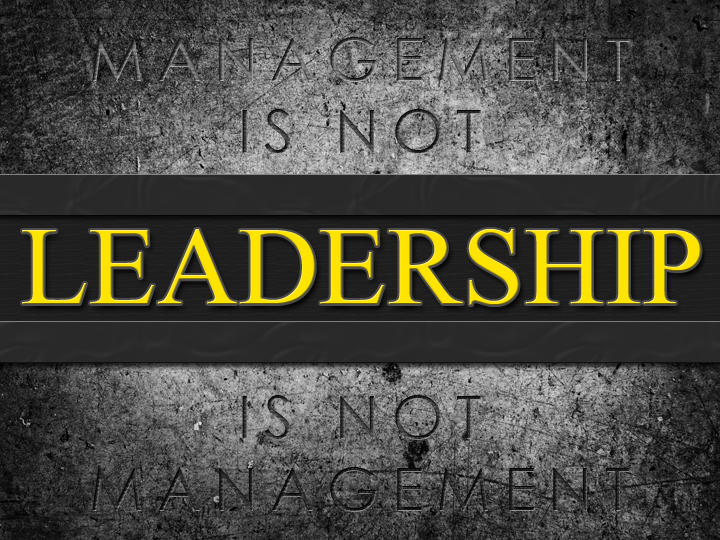Leadership Lesson: 10 Things Leaders Must Know
Leaders must know that the term Leadership has been cheapened in recent years. This is due largely to people with no leadership background whatsoever trying to teach it or write about it. These people are really doing nothing more than making the entire industry look bad because they claim to be leadership professionals but ultimately fail in their promises to their clients or simply share information or tips that are very much NOT leadership ideas and are, ultimately, counterproductive.
As a result, there is a lot of confusion regarding what leadership is or what it can do. Sure, I could write an article(s) about what it is, but I believe there is a great benefit in understanding what leadership is NOT. So here are just ten things (out of many) that I think people need to know about the actual leadership discipline.
Leadership is NOT a Buzzword
A buzzword is a trendy or fashionable word that people or organizations often use to make themselves or their ideas sound important or impressive. However, buzzwords are often used to mislead or manipulate laypeople, much like how some people use big words to try to appear intelligent but end up sounding foolish.
In recent years, the term “leadership” has unfortunately become a buzzword that is frequently misused for marketing and job recruitment purposes rather than being used to genuinely seek or cultivate true leadership. This can be confusing and dilutes the significance of the discipline of leadership. It is important to use the term accurately and responsibly rather than just as a buzzword for superficial purposes.
Leadership Cannot be Summed up with a Quote
There are many quotes about leadership that can be found online, but it is important to remember that leadership cannot be fully understood or mastered through a single quote or definition. Leadership is a complex discipline that requires study, dedication, context, and practice to truly understand and effectively implement. Reducing the complexity of leadership to a single quote is like trying to summarize the field of engineering with a simple definition – it does not adequately capture the depth and breadth of the subject.
Leadership Cannot be Summed up in a Short Post
There are countless books and studies on leadership, yet it is often oversimplified or reduced to a single paragraph or social media post. However, if leadership were truly that simple, there would be no need for undergraduate, master’s, or doctorate degrees in leadership theory. The complexity of leadership warrants a deeper understanding and analysis, which can take years of dedicated study and practice.
It is frustrating to see leadership reduced to a short post or phrase that marginalizes its true nature. Such oversimplification cheapens the discipline of leadership and does not do justice to its complexities and potential. Leadership is a multifaceted and ever-evolving field requiring deeper understanding and appreciation.
Leadership Is Not a Horoscope
It is common to see leadership gurus present leadership principles as if they apply to everyone and every situation in the same way. While some elements of leadership may be universal, it is important to recognize that leadership is a complex and multifaceted field that requires a nuanced and situational approach. A one-size-fits-all approach to leadership is often insufficient and can be misleading.
It is important to be cautious when implementing leadership tactics and strategies from leadership gurus, as they may not necessarily be relevant or effective in your specific industry or context. Again, leadership approaches are often situational and require a tailored approach that considers the unique needs and challenges of the organization and its stakeholders. One size usually does not fit all.
Visiting a Conference Does Not Make you a Leader
Many leadership conferences and events tend to focus on motivational speeches rather than providing a deeper understanding and analysis of the discipline of leadership. While it can be inspiring to hear uplifting messages, it is important to recognize that true leadership development requires more than just a few catchphrases or buzzwords.
Leadership cannot be learned on the weekend or by simply emulating the traits and behaviors of others. It requires a commitment to ongoing study, practice, and self-reflection. Simply attending a leadership seminar or hearing an overview of leadership theory does not make someone a leadership professional, just like attending a first-aid seminar does not make someone a doctor.
Leadership is NOT Management & Management is NOT Leadership

Leadership and management are two distinct concepts that are often confused or used interchangeably. However, it is important to recognize that leadership and management are fundamentally different. Leadership is about inspiring and guiding others toward a shared vision, while management is about organizing and directing resources to achieve specific goals.
True leaders who are trained in leadership principles often avoid management techniques and strategies, as they may be seen as incompatible with the goals and values of leadership. In fact, some in the industry view management as a hindrance to effective leadership, as it can undermine the collaborative and inspiring leadership approach. It is important to understand the differences between leadership and management and to use the appropriate strategies and techniques in different situations. John P. Kotter wrote a great story about this for the Harvard Business Review back in 2013. It’s called Management Is (Still) Not leadership. It’s a good read.
Leadership is not a “Quick Learn“
Similar to a previous point, attending a leadership course, whether it is a week-long program or a longer program, is a great start to learning about leadership. However, it is important to recognize that true leadership development is a lifelong process that requires ongoing study, practice, and reflection. It is not a skill that is learned in a short period of time but rather a discipline that requires a sustained commitment to growth and improvement.
Consider other skills or disciplines that require a significant amount of time and dedication to master, such as driving, athletics, or music. Becoming proficient in these areas takes time and practice, and the same is true for leadership. Leadership development is an ongoing journey, not a one-time event.
I have an undergraduate degree in leadership, a master’s degree in leadership, and a doctorate in leadership. I can promise you that we are not sitting around rehashing leadership quotes for eight years. If you could cram all that information into a week or month-long course, there wouldn’t be a need for such serious leadership study, and everyone would be doing it. On a related note, and while I’m thinking about it, let me share an article by Inc.com called 7 Reasons You Can’t Learn Leadership on Your Own.
The Secret to a Becoming a Great Leader is to Learn More about Being a Leader
The key to developing expertise in leadership is to continue learning about the subject and to seek out mentors who can provide guidance and support. Observing leadership in action is a valuable learning experience, but it is not enough on its own to truly develop leadership skills. In order to transfer knowledge and understanding to ourselves, we must actively seek out opportunities to learn and grow.
It is important to recognize that a solid understanding of leadership takes time and effort to develop. Simply reading a book or two is unlikely to provide a comprehensive understanding of the subject. To truly master the discipline of leadership, it is necessary to engage in ongoing study and practice and to be humble enough to recognize that there is always more to learn.
Many “Leadership Pros” Suffer from the Dunning-Kruger Effect
The Dunning-Kruger effect refers to the phenomenon in which people overestimate their own competence and ability in a particular area. In the field of leadership, this can be problematic as it may lead individuals to believe that they are qualified to teach leadership principles and practices, even if they have only limited knowledge or experience. It is important for individuals who are interested in leadership to be aware of the Dunning-Kruger effect and to recognize the limitations of their own knowledge and experience. It is also important to seek out credible and experienced leadership experts who can provide valuable guidance and support.
Some data suggests that quite a few of these programs fail to provide the necessary results. While I don’t necessarily agree with all of the findings, I would add that (based on what I have seen) another big part of this is that many people teaching leadership are not qualified to teach it in the first place. Personally, I can’t tell you how many leadership teachers I have spoken with who (admittedly) have absolutely NO IDEA what they are attempting to teach. They don’t know the theories, terms, types, or application methods. In fact, on more than several occasions, I’ve even been told that their only qualifications were that they were in a management position for years and were successful at that. SCARY!
Leadership Is Not Magical
Leadership is not simply a matter of repeating inspiring quotes or trying to emulate certain behaviors or traits. It is a complex and multifaceted discipline that requires a thorough understanding of various theories, practices, and evaluation methods. Real leadership study involves learning about strategic forecasting and decision-making, research methods, motivation techniques, change models, negotiation, facilitation, bias evaluation, and control, mindfulness, emotional intelligence, heuristics of the human mind, organizational structure, psychology, business, international business and global trends, qualitative and quantitative analysis, influence and behavior evaluation, and much more.
Leadership is a dynamic and scientific discipline that requires a diverse and comprehensive understanding of the various factors that shape and influence it. To be an effective leader, it is necessary to have a deep and broad understanding of leadership principles and practices and how they can be applied in different contexts.
So What Is Leadership?
Leaders must know that leadership isn’t just something you do, and it’s not a magical thing that just happens. Leadership is a discipline. In other words, leadership is the culmination of numerous things that you learn and learn how to use. Then, once you have achieved a decent level of competency, you will spend your entire life trying to master what you have learned.
Do you like reading about leadership? Be sure to check out some of my other leadership articles such as “Leadership Lessons from the Mouths of Leaders.“




